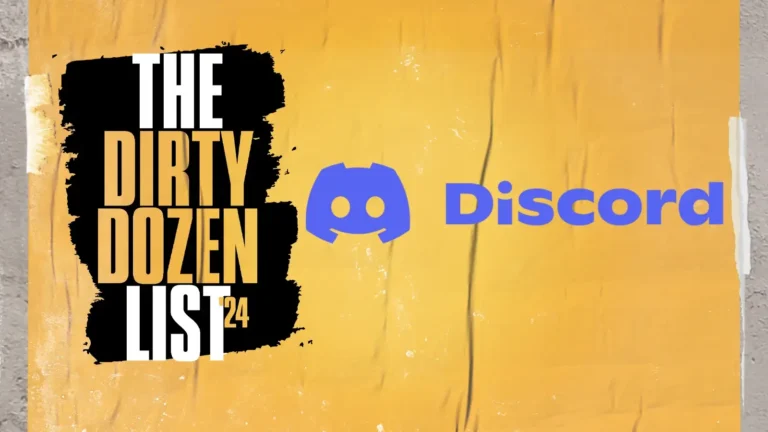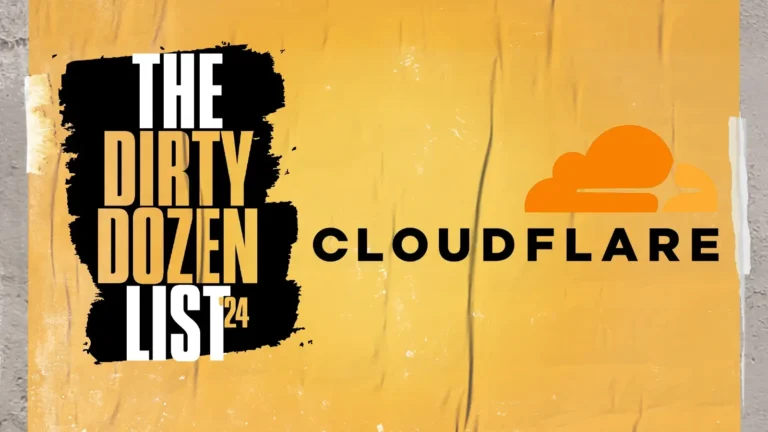February 9, 2021 is the global observance of Safer Internet Day.
Safer Internet Day focuses on the idea that everyone plays an important role in making the internet better.
To protect children online, and create a space where all are free from the harms of sexual abuse and exploitation, we all—families, corporations, governments—play an important role.
The Dirty Dozen List is working to make internet safer by engaging individuals to advocate for changes in major corporations who prop up sexual exploitation through their platforms or services.
Mainstream corporations wield enormous power and influence—shaping individuals’ behaviors and beliefs, as well as broad cultural norms. They often boast lofty, seemingly-benevolent mottos and catch phrases like “do the right thing” and “a company with a conscience.” Yet many of them facilitate and benefit from sexual abuse and exploitation.
Going up against giant tech companies, Fortune 500 corporations, and the billion-dollar pornography industry can often be utterly overwhelming. Even the most optimistic among us can feel daunted, questioning whether any effort—big or small—can make a difference.
But we assure you that YES! Collectively, we can change corporations … and we have.
In fact, 2020 may have been one of the National Center on Sexual Exploitation’s most impactful years—both for our overall work and certainly in our corporate advocacy efforts. After thousands of individuals like YOU acted through the 2020 Dirty Dozen List and our other campaigns, several major entities across multiple industries adopted recommendations made by NCOSE: adjusting problematic policies, products, and platforms.
These changes led to a fragmentation of the porn industry’s infrastructure, resulted in refined reporting mechanisms (and therefore hopefully quicker removal) for child sex abuse material, reduced the risk of kids being accessed by predators, stemmed sex buyers’ ability to purchase bodies for their pleasure, and minimized exposure (by adults and minors alike) to the harmful effects of pornography.
As we gear up for the reveal event of the 2021 Dirty Dozen List (register here!), we hope you’ll join us in celebrating the victories of the past year that you helped us achieve.
Dirty Dozen List 2020 Victories
Amazon
We’ve been pressing Amazon for quite some time to create better systems to prevent kids from easily accessing the many Amazon Prime titles that contain gratuitous nudity and sexual violence. Sexually explicit previews were posted and even auto-played right next to children’s movies and shows. This summer, Amazon finally rolled out some parental controls, including the ability to set up different profiles with content restrictions. The Amazon empire still has many major problems to fix, but at least Prime has made some improvements. Learn about the safety update here and encourage Amazon to stop the business of sexploitation by going here.
This trillion-dollar tech giant has been the target of our persistent advocacy for nearly a decade. After once again being on the Dirty Dozen List, this past April Google changed their algorithms to decrease exposure to hardcore pornography for users looking up innocent, unrelated, or scientific terms in Google Images (Note: pornography is still accessible via Google searches). In December, Google made advertising policy changes to move their prohibited “Adult” content to the “Inappropriate” content section. They’ve also banned ads promoting prostitution—including “compensated dating” (i.e. “sugar dating.”) These changes are significant in stemming the normalization of the commercial sexual exploitation industry.
Netflix
Entertainment titan Netflix had an interesting year. Though we were (and continue to be) outraged Netflix hosted “Cuties,” a movie that sexually exploited and continues to sexualize the very young actresses, they did make some very necessary changes. Soon after placement on the Dirty Dozen List, they improved their parental controls. Furthermore, Netflix modified its rating to 12+ on Apple App Store and Teen on Google Play—more accurately reflecting type of content accessible on its platform, allowing families to make more informed decisions about the products they use.
Snapchat
Snapchat has consistently been noted by teens as their most important online social network. Unfortunately, children as young as 13 have been exposed to graphic sexual content and promotion of risky sexual behavior (like sexting) through Snapchat’s Discover stories. And sexual abuse, pornography and prostitution accounts are found throughout. We’ve worked closely with their team and are pleased that Snapchat has made improvements to their Discover section – allowing publishers to age-gate content (which means younger users are not being as inundated with sexually explicit content as they were just a few months ago), and allowing users to delete specific Discover publishers. Learn more and act here.
TikTok
TikTok may have been the biggest surprises of 2020. TikTok was on the Dirty Dozen list as a major offender: with child safety experts calling it a predator’s playground due how easily they could interact with kids, grooming them for abuse, sending and requesting nude images, commenting on minors’ videos, etc. After meeting with our team, TikTok made significant changes and continued to do so the rest of year such that we now use them as an industry standard we’d love other online platforms to follow. While the content on the platform is still highly problematic and jury is still out for how well they’re implementing, we’re grateful for the changes they’ve made. Read more and thank TikTok here.
United Airlines
This is one of our favorite success stories of the year. United was so distraught after learning they were staying on the 2020 Dirty Dozen List, that a few days before the reveal event, they committed to combat in-flight sexual harassment and pornography-use. United instituted training for flight attendants emphasizing a zero-tolerance policy for hardcore pornography (and anything over an R-rating) on personal devices. These changes certainly made the skies much friendlier.
Visa and other credit card companies
One of the most effective ways of dismantling the infrastructure of the porn industry is by crippling the payment process. After several meetings with executives, persistent public pressure through the Dirty Dozen List, and a global campaign led by NCOSE’s international arm (ICOSE), all of which elevated the brave witness of survivors, Visa, Mastercard, and Discover cut ties with Pornhub for facilitating and profiting from the most egregious abuses. They’re now investigating other porn sites. In a briefing with Mastercard, their team told us that if it weren’t for NCOSE, they would not have known the extent of the abuse on Pornhub.
While Instagram hasn’t been on the Dirty Dozen List (its parent company Facebook has), we’ve singled out this app boasting a billion monthly active for its own advocacy campaign: #WakeUpInstagram. NCOSE, ICOSE, and several of our ally organizations have been meeting with executives for the past two years and are encouraged by the changes they’ve been making. Most recently, Instagram improved reporting tools so the platform can take quicker and more targeted action against abusive users.
To those who have taken part in these campaigns: Thank you. The petitions you’ve signed have yielded policy changes. Emails you’ve sent executives have spurred enactment of safeguards. Social media messages you’ve shared helped shaped viewpoints…You have been instrumental in shifting corporate policies, which in turn propels forward a culture of dignity.
And don’t stop now! Sign up for the Dirty Dozen Reveal Event on February 23, 2021.
What do you think? Should we leave any of the target listed above on there? Who are we going to add? How can you continue making a difference? Register here to find out.
Lastly, in case you missed the link above, you can access our 2020 Impact Report to read about the many other wins NCOSE and our movement achieved during a year like no other.



